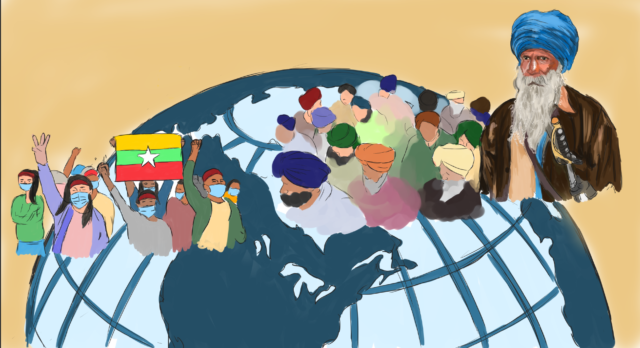Ignorance may be bliss when it comes to international affairs, but it’s also selfish.
The pandemic has forced us all to reckon with the ways gaining an education has become harder for some of our peers during remote learning. However, outside of appreciating what is happening in our fellow student’s lives, we also have an obligation to understand what is happening in our global community.
While the United States is experiencing its own range of crises, from the ongoing COVID-19 pandemic to a massive snowstorm sweeping the nation, this does not mean Bruins should turn a blind eye to the rest of the world. Because at the moment, there are many issues abroad that deserve attention. In Myanmar, a military coup has left the government in chaos, and human rights organizations have called out Israel’s slow and inadequate distribution of vaccines to Palestinians living in occupied territories as a violation of the Geneva convention.
When UCLA students came to campus, we joined an international community of educators and students who recognize that knowledge is key to bettering our world. We have an obligation to expand the definition of ‘our’ community by educating ourselves on matters that may not happen on our respective countries’ soil.
It’s the least we can do as members of a world that seems to grow more chaotic by the day.
Swan Htut, a fourth-year global studies and sociology student, said the dean of students has been working closely with the Burmese Student Association to ensure the university meets mental health and financial needs of Burmese students affected by the unrest in Myanmar, but the same level of awareness has not been as evident among fellow students.
“It’s very understandable that … even UCLA students who tend to keep themselves informed on these issues find it difficult to keep themselves informed on every issue just because it is exhausting,” Htut said. “But I do think it is a part of our responsibility to stay updated, to stay informed and at the very least to do what we can.“
UCLA has students from many corners of the world and their homes are no less important than the homes of Bruins who are a short drive from campus. As members of our community, they must have their voices amplified and their concerns heard.
After all, bigotry isn’t far from campus. Just this week, the FBI arrested UCLA student Christian Secor for his alleged participation in the Jan. 6 Capitol riots. It’s important that the UCLA community actively rally behind values that do not promote an exclusionary “American First Bruins” mentality.
While some issues may seem unsolvable from our Westwood apartments and campus dorms, it doesn’t mean that we are immune from their effects, especially when it comes to how countries handle the COVID-19 pandemic.
Dov Waxman, the Rosalind and Arthur Gilbert Foundation chair in Israel Studies at UCLA and director of the Nazarian Center for Israel Studies, said the question of Israeli vaccination of Palestinian people is a legal, practical and moral debate.
“The Nazarian Center has been doing lots of events … but they haven’t been as well attended by UCLA students as we would have liked,” Waxman said. “I think just what’s happening in American politics is taking many students’ attention, understandably.”
In the last year, many Bruins have faced financial instability, loss and stress. It is easy to ignore the rest of the world’s problems when America is reeling from the compounded effects of multiple disasters, but everyone is living through a pandemic and compassion needs to extend far beyond our Westwood bubble.
Audrey Aldisert, a third-year international development studies and political science student, said Bruins’ obligation to the global community stems from a deeper need for America to recognize its role in creating crises in other nations.
“It’s very American to think that what we do only pertains to us, only affects us, that we live in a vacuum – that’s just not the case,” Aldisert said. “All of our policies or laws, you know, directly or indirectly affect the world.”
UCLA recognizes that our community is larger than its campus, its city or its country, and students should do the same. It’s necessary for all Bruins, not just international ones, to continue to care and discuss issues that take place outside their immediate borders. And for international students, it is equally vital that their attention extends beyond just their homes and Westwood.
The pandemic hasn’t been easy on anyone, and while those troubles may occupy our minds, we have an obligation to use our resources to remain critical on domestic and international issues of justice – especially when such instances are instigated and funded by our own.
These problems may not be relevant to the individual, but they are relevant to our world.
And just like a line on a map can’t stop a virus, it shouldn’t stop our empathy.

